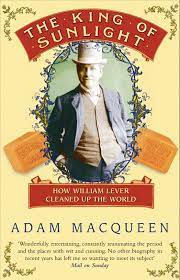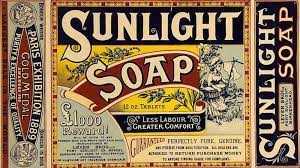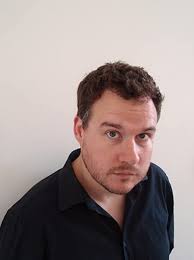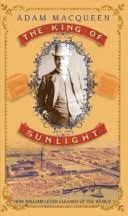GoodReads meta data is 331 pages rated 3.95 by 39 litizens.
Genre: biography*
Verdict: Scatter gun does occasionally hit targets.

William Lever (1851-1925) was born a dry goods store owner’s son, who learned the business sweeping the floor. That was an especially onerous duty in the backroom where large bars of all-purpose soap were cut into one pound sizes. The trimmings that fell to the floor were profuse and sticky. This boy had a lot of trouble sweeping them up only to throw them away. That seemed like wasted effort and so the first of a long string of innovations came. He wrapped these floor sweepings neatly and labeled them soap flakes. After all, to use the one-pound lumps of soap a housewife had to scrape flakes off it, thus buying ready-made flakes was a labour-saving step and they could be sold cheap since they had been heretofore waste, and it proved popular and profitable. His father soon gave him his head and stood back.
There followed many other elementary changes that brought a competitive advantage, like cutting the soap into bars of a hand size. Later he distinguished between soap for laundry and soap for person with additives in the latter. And so.
He made his soap first a national and then an international business, scattering innovations like seeds in the wind. Some did not work out, most did. He was quick to make use of new-fangled advertising and made innovations in that, too.
The paternalism in him led to philanthropy, although he always denied that he ever gave anything away. It was all a business investment in his mind. He built an ideal community in Cheshire near Liverpool for his principal manufacturing plant, called Port Sunlight (after his most successful product line), which we visited in 2004. It reflects the man in that the architecture is varied, not uniform as it is in other model communities, and endowed with art works and green spaces galore. An art gallery was located between the residences and the factory so that workers on the way to and from home could walk through it for their edification. It provided a dry-cut when it rained and was designed to accommodate wet feet and umbrellas with drains and mats.
He collected art by the simple expedient of buying the complete collections of others, selecting for his private residences the works he liked, and using the rest to adorn Port Sunlight and Lever offices around the world. He was something of a magpie in collecting as the museum at Port Sunlight shows.
He established the eight-hour day at Port Sunlight. Paid the highest wages in the land, and turned gigantic profits much of which he ploughed back into Port Sunlight, while expanding the business overseas and vertically integrating it with suppliers. In time, with increased mechanisation, he cut the week from 6 to 5 and 1/2 to 5 days. He was widely detested for all this by business rivals who tried to blacken his name with smears and innuendo. Each of which he batted off with a team of lawyers.

He was a lifelong supporter of the Gladstone Liberal Party, including its efforts to end the state religion and grant home rule to Ireland, and was elected to parliament where his sole purpose was to advocate and agitate for a national old age pension comparable to that which he paid his retiring employees, both men and women. The norm at Lever Brothers was equal pay for equal work between men and women. He carried that over more generally and was an advocate of female suffrage. Thus he practiced and preached equality for women with men, but that was not enough for some people.
One zealot made an example of him by burning down his house (and all its familial and artistic contents), she said, to light a beacon for women’s suffrage, further saying that until that goal is achieved everything has to be attacked, even allies, it seems. It is a kind of Pox News logic of attacking a soft target. No one was home and no one was injured but it both hurt his feelings and angered him so that he rebuilt the house…in stone, so that it could not be burned again by another nutcase. It did not cause him to weaken in his advocacy of the suffrage, but he did take pleasure when the malefactor was slammed up.

His efforts at vertical integration in the Solomon Islands and then the Congo led him to realise how terrible colonialism was, and he treated the natives he dealt with better than any other European had ever done. This fact does not spare him the troll attacks on Wikipedia today where he is castigated for not having 21st Century sensibilities by people whom in turn will be castigated one day for not having 23rd Century sensibilities. History has become troll berate troll.
He was a micro-manager even as the business grew and grew to become an international behemoth. To do so he wrote – yes wrote, not dictated – 50,000 letters a year. The archive swamps most biographers. This one did not even dip a toe into it. As the majority owner he did not distinguish his private interest from those of the company and in time that came unstuck. Lever Bros did not quite recover from World War I and its aftermath, when prices fell, competition emerged, foreign markets disappeared. Lever tried to keep doing things the old way as the capital dissipated, until there was a management coup d’état in 1922-1923 and he finally let go of the reins, reluctantly, slowly, sporadically….
In the 1930s Lever Bros merged with United Soaps of the Netherlands and become UniLever which remains a diverse and gigantic multi-national. It long operated a large plant nearby in Balmain (established 1895) until land prices made it profitable to sell the area (for residences) and relocate to Minto south west of Sydney. Here are a few of the current UniLever brands: Vaseline, Ben & Jerry’s, Knorr, Magnum, Vif, Comfort, Domestos, Lifebuoy, Dove, Omo, Sunlight, and so on and on.
How his formative years led him to these ventures, how he learned and changed as he went, his relationship with his long-suffering wife (for he insisted throughout his life on sleeping in the open air on specially designed rooftops – true!), his response to failure (and he had a few), are invisible in these pages.

*The book has to be catalogued as biography but it isn’t, hence the asterisk above. It is a string of anecdotes that reflect the interests of the author more than the importance of the stories in forming or revealing Lever. It is also punctuated with the sort of snide, adolescent ad hominem cheap shots so prolific in Bill Bryon’s sophomoric books.
There is a short, grudging entry on Lever in Wikipedia that hardly does the man justice. Pedants note. There was a younger brother who worked in the business initially, hence the name, but left it after few years.
I listened to an episode of the BBC Radio 4 program Great Lives about Lever while on my walks across north Newtown, and recalling our visit in 2004 to Port Sunlight, I followed up with this book. Lever is certainly worth reading about but I cannot recommend this book to any serious reader. It is too self-indulgent, too one-eyed, and superficial. The author is the star of this show, not the subject.

